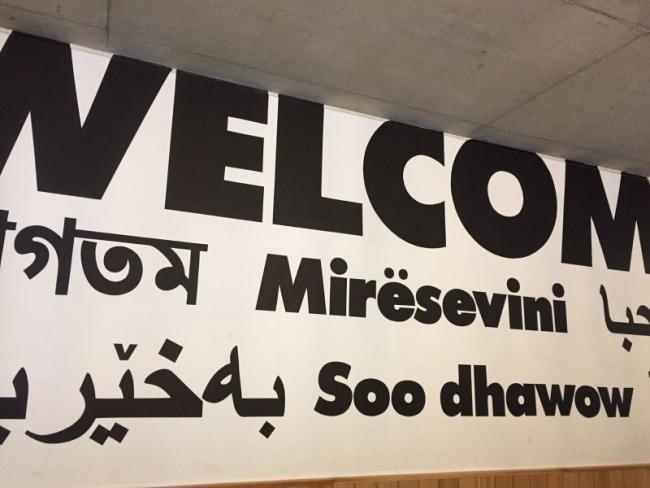Multilingual poetry workshops with the London Centre for Languages & Cultures

In June, Laura Lonsdale and I once again went to London for some Creative Multilingualism workshops with Year 10 students, this time at the Westminster Academy, and with students also from Pimlico Academy, Lady Margaret School, Sacred Heart Academy, and Hammersmith Academy. Altogether we had 35 students and five teachers.
Our first session was a broad and wide-ranging celebration of multilingualism and of the many languages spoken by students in the room. We had some lively discussions of the singular and dynamic ways in which they use their languages, while also reading together and discussing some of the poems from the PEN volume ‘Brave New Voices’ specifically reflecting on ‘my language’.
One of the highlights of the first session was the work we did with the Portuguese poem ‘Eu Falo’ and its English translation ‘I speak’, which students were able to translate again into French, Spanish, Italian, Polish, Swedish, Kosovan, Egyptian Arabic, Moroccan Arabic, Thai, Burmese, and Japanese. They spoke in lively and thoughtful ways about the challenges of the exercise and the phrases that seemed to resist translation.
We were impressed by the students’ energetic engagement with the activities we set, by their extraordinary linguistic competence, and the thoughtfulness with which they were able to analyse their language usage. But it was in the second and third sessions that their creativity really came to light. During the second session, we read translingual poems using French and Spanish, and found the students could cope admirably with challenging poetic material.
They had a lot of subtle and intelligent ideas about intercultural creativity and its social and ethical implications. In the final session, students were introduced to various poetic forms, including cinquains, haikus and acrostics, before working to produce their own multilingual creations. Students were bold in writing in a range of languages, many using French and Spanish, but we also had whole poems in Urdu and Swedish, and a beautiful poem about friendship alternating between lines in English, Italian and Spanish.
The workshops revealed to us the extraordinary linguistic talent alive in these London schools, a talent that students seemed not to recognise in themselves, and which the curriculum at the moment doesn’t valorise. They also showed us how committed the students are to their languages but also to learning new languages – they really demonstrated their passion for discovery, for communication, for learning about new ways of seeing the world.
Their poems gave us insight into their enormously diverse and dynamic communities, conveying their respect for one another’s differences and willingness to listen and learn. We’re privileged to have spent this day with them, but remain convinced that more work needs to be done both to remind school children of their fantastic assets and abilities, and to show them the extent of what they can do both with the languages they speak at home and those that they learn in the classroom.
Feedback
Of the respondents:

... said the event made them realise they could be creative with language in ways they hadn’t thought of before.

... said the event made them think differently about the creative potential of using more than one language.

... said the event made them think differently about the languages they speak and their relationship with one another.

... said they would like to try creative writing again.

... said the event made them consider choosing French of Spanish A’level (though several respondents said that they had already made this choice).
Some student comments:
‘I had never heard of multilingualism!’
‘The event has made me more creative, I used different languages and learned some as well’
‘I understand better the importance of languages and that we can have fun with them’
‘Mixing languages makes things sound interesting and fun’
‘Poems and mixing languages can help show greater meaning’
‘This event has brought a lot of people together and made us think about sensitive topics like racism, etc’
Jane Hiddleston is Professor of Literatures in French at the University of Oxford and Laura Lonsdale is an Associate Professor of Spanish Literature at the University of Oxford. They ran this workshop as part of Creative Multilingualism's 5th strand: World Literatures.
Where next?
Celebrating linguistic diversity through multilingual poetry
Multilingual concert: We are Children of the World
‘Lessons learnt’ by a professional translator – adapting the same play three times over three years